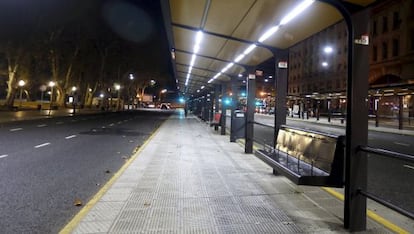Strike paralyzes Argentina four months before presidential primaries
Unions that support government also join work-stoppage over employee taxes


A nationwide strike paralyzed much of Argentina on Tuesday as labor and political groups, including those who support President Cristina Fernández de Kirchner, began joining public transportation workers, who had called for a 36-hour work stoppage.
What began as a transportation shutdown quickly won the support of diverse groups such as bank employees, waste collectors and gasoline station owners, who also stayed home.
The unions are also thought to be flexing their muscles ahead of the August 9 presidential primaries
Most Argentineans were unable to get to their place of work because buses and trains were not running.
Two large labor unions, which represent train workers and bus drivers, called the strike to protest the government’s refusal to change the tax system to adjust for inflation. But the unions are also considered to be flexing their muscles ahead of the August 9 presidential primaries.
Besides the suspension in public transportation services from midnight Tuesday, Argentina’s far-left groups picketed in front of some establishments and government agencies, while the opposition Leftist Front (FI) party blocked major highways and roads leading to Buenos Aires.
That was one of the reasons why workers who belong to unions that did not support the strike also were unable to get to their jobs on Tuesday. Schools in many parts of the capital were also empty.
The press in other major cities such as Córdoba, Rosario, Tucumán, Mendoza and La Plata reported that the strike was causing a major impact in those areas.
“There would have been a 95-percent assistance today, but they couldn’t come because they had no transport,” said Aníbal Fernández, the president’s Cabinet chief and one of six candidates running for the ruling coalition’s presidential nomination. He called the strike “political.”
Economy Minister Axel Kicillof has maintained that income taxes will only affect “between 10 and 15 percent of workers” who earn higher salaries.
But the popular Infobae news portal reported on Monday that at least 27 percent of all workers will be affected and not just those who earn high salaries.
At the same time, Argentina’s annual inflation rate now stands at 29.9 percent, according to statistics agencies in the different provinces.
The unions fear that salary rises proposed under new collective contract revisions set for negotiation this year will be mostly absorbed by workers’ taxes.
With just a little more than four months to go before the presidential primary, the strike is designed to send a clear message to all candidates.
The three top contenders are Daniel Scioli, a moderate from the ruling party coalition; Sergio Massa, who represents a Peronist faction opposed to the government; and Mauricio Macri, the conservative governor of Buenos Aires province.
“We are taking a position before this government and before those who will come to serve following this current term,” said Juan Schmid, one of the transportation sector’s union bosses.
The strike has also measured the strength between the country’s major union leaders.
Hugo Moyano, the powerful teamster boss who led three strikes against the Fernández de Kirchner government in 2012 and 2014, now has competition from the president’s one-time union allies such as Roberto Fernández, who heads the bus drivers’ syndicate, and Omar Maturano, who is leader of the rail sector union.
Tu suscripción se está usando en otro dispositivo
¿Quieres añadir otro usuario a tu suscripción?
Si continúas leyendo en este dispositivo, no se podrá leer en el otro.
FlechaTu suscripción se está usando en otro dispositivo y solo puedes acceder a EL PAÍS desde un dispositivo a la vez.
Si quieres compartir tu cuenta, cambia tu suscripción a la modalidad Premium, así podrás añadir otro usuario. Cada uno accederá con su propia cuenta de email, lo que os permitirá personalizar vuestra experiencia en EL PAÍS.
¿Tienes una suscripción de empresa? Accede aquí para contratar más cuentas.
En el caso de no saber quién está usando tu cuenta, te recomendamos cambiar tu contraseña aquí.
Si decides continuar compartiendo tu cuenta, este mensaje se mostrará en tu dispositivo y en el de la otra persona que está usando tu cuenta de forma indefinida, afectando a tu experiencia de lectura. Puedes consultar aquí los términos y condiciones de la suscripción digital.








































